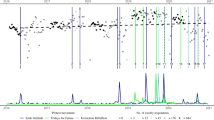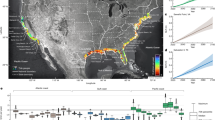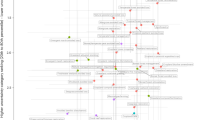Abstract
As climate change progresses, the risk of adverse impacts on vulnerable populations is growing. As governments seek increased and drastic action, policymakers are likely to seek quantification of climate-change impacts and the consequences of mitigation policies on these populations. Current models used in climate research have a limited ability to represent the poor and vulnerable, or the different dimensions along which they face these risks. Best practices need to be adopted more widely, and new model features that incorporate social heterogeneity and different policy mechanisms need to be developed. Increased collaboration between modellers, economists, and other social scientists could aid these developments.
This is a preview of subscription content, access via your institution
Access options
Access Nature and 54 other Nature Portfolio journals
Get Nature+, our best-value online-access subscription
$29.99 / 30 days
cancel any time
Subscribe to this journal
Receive 12 print issues and online access
$209.00 per year
only $17.42 per issue
Buy this article
- Purchase on Springer Link
- Instant access to full article PDF
Prices may be subject to local taxes which are calculated during checkout

Similar content being viewed by others
References
De Cian, E., Hof, A. F., Marangoni, G., Tavoni, M. & van Vuuren, D. P. Alleviating inequality in climate policy costs: an integrated perspective on mitigation, damage and adaptation. Environ. Res. Lett. 11, 74015 (2016).
Mendelsohn, R., Dinar, A. & Williams, L. The distributional impact of climate change on rich and poor countries. Environ. Dev. Econ. 11, 159 (2006).
Tol, R. S. J., Downing, T. E., Kuik, O. J. & Smith, J. B. Distributional aspects of climate change impacts. Glob. Environ. Change 14, 259–272 (2004).
Edenhofer, O. et al. in Climate Change 2014: Mitigation of Climate Change (eds Edenhofer, O. et al.) (IPCC, Cambridge University Press, 2014).
Field, C. B. et al. in Climate Change 2014: Impacts, Adaptation, and Vulnerability (eds Field, C. B. et al.) 35–94 (IPCC, Cambridge Univ. Press, 2014).
Hallegatte, S. et al. Shock Waves: Managing the Impacts of Climate Change on Poverty (World Bank Publications, 2015).
O’Neill, B. C. et al. A new scenario framework for climate change research: the concept of shared socioeconomic pathways. Clim. Change 122, 387–400 (2014).
Cameron, C. et al. Policy trade-offs between climate mitigation and clean cook-stove access in South Asia. Nat. Energy 1, 15010 (2016).
Kline, K. L. et al. Reconciling food security and bioenergy: priorities for action. GCB Bioenergy 9, 557–576 (2017).
Hasegawa, T. et al. Consequence of climate mitigation on the risk of hunger. Environ. Sci. Technol. 49, 7245–7253 (2015).
Rogelj, J. et al. Paris Agreement climate proposals need a boost to keep warming well below 2 °C. Nature 534, 631–639 (2016).
Poverty: Overview (World Bank, accessed 5 November 2016); http://www.worldbank.org/en/topic/poverty/overview.
Reddy, S. G. & Lahoti, R. $1.90 Per Day: What Does it Say? http://dx.doi.org/10.2139/ssrn.2685096 (27 October 2015).
Alkire, S. & Santos, M. E. Measuring acute poverty in the developing world: robustness and scope of the multidimensional poverty index. World Dev. 59, 251–274 (2014).
Milanovic, B. Worlds Apart: Measuring International and Global Inequality (Princeton Univ. Press, 2005).
IPCC Climate Change 1995: Economic and Social Dimensions of Climate Change (eds Bruce, J. P., Lee, H. & Haites, E. F.) (Cambridge Univ. Press, 1996).
Schelling, T. C. Some economics of global warming. Am. Econ. Rev. 82, 1–14 (1992).
Dennig, F., Budolfson, M. B., Fleurbaey, M., Siebert, A. & Socolow, R. H. Inequality, climate impacts on the future poor, and carbon prices. Proc. Natl Acad. Sci. USA 112, 15827–15832 (2015).
Olsson, L. et al. in Climate Change 2014: Impacts, Adaptation, and Vulnerability (eds Field, C. B. et al.) 793–832 (IPCC, Cambridge Univ. Press, 2014).
Krey, V. Global energy-climate scenarios and models: a review. Wiley Interdiscip. Rev. Energy Environ. 3, 363–383 (2014).
Anthoff, D., Hepburn, C. & Tol, R. S. J. Equity weighting and the marginal damage costs of climate change. Ecol. Econ. 68, 836–849 (2009).
Anthoff, D. & Tol, R. S. J. On international equity weights and national decision making on climate change. J. Environ. Econ. Manage. 60, 14–20 (2010).
Adler, M. D. et al. Priority for the worse off and the social cost of carbon. Nat. Clim. Change 7, 443–449 (2017).
Anthoff, D. & Emmerling, J. Inequality and the Social Cost of Carbon. Working paper 2016.054 (FEEM, 2016).
Stanton, E. A. Negishi welfare weights in integrated assessment models: The mathematics of global inequality. Clim. Change 107, 417–432 (2011).
Stanton, E. A., Ackerman, F. & Kartha, S. Inside the integrated assessment models: Four issues in climate economics. Clim. Dev. 1, 166 (2009).
Anthoff, D. Optimal Global Dynamic Carbon Abatement (Univ. California, Berkeley, 2011).
Budolfson, M., Siebert, A. & Spears, D. Optimal Climate Policy and the Future of World Economic Development (World Bank, 2017).
Budolfson, M., Dennig, F., Fleurbaey, M. et al. The comparative importance for optimal climate policy of discounting, inequalities and catastrophes. Clim. Change https://doi.org/10.1007/s1058 (2017).
Chambwera, M. et al. in Climate Change 2014: Impacts, Adaptation, and Vulnerability (eds Field, C. B. et al.) 945–977 (IPCC, Cambridge Univ. Press, 2014).
Rausch, S., Metcalf, G. E. & Reilly, J. M. Distributional impacts of carbon pricing: A general equilibrium approach with micro-data for households. Energy Econ. 33 (Suppl.), S20–S33 (2011).
Liang, Q. M. & Wei, Y. M. Distributional impacts of taxing carbon in China: Results from the CEEPA model. Appl. Energy 92, 545–551 (2012).
Callan, T., Lyons, S., Scott, S., Tol, R. S. J. & Verde, S. The distributional implications of a carbon tax in Ireland. Energy Policy 37, 407–412 (2009).
Siriwardana, M., Meng, S. & McNeill, J. The Impact of a Carbon Tax on the Australian Economy : Results from a CGE Model (UNE, 2011).
Bureau, B. Distributional effects of a carbon tax on car fuels in France. Energy Econ. 33, 121–130 (2011).
Rausch, S. & Schwarz, G. A. Household heterogeneity, aggregation, and the distributional impacts of environmental taxes. J. Public Econ. 138, 43–57 (2016).
Williams, R. C., Gordon, H., Burtraw, D., Carbone, J. C. & Morgenstern, R. D. The Initial Incidence of a Carbon Tax across Income Groups (Resources for the Future, 2014).
Mathur, A. & Morris, A. C. Distributional effects of a carbon tax in broader US fiscal reform. Energy Policy 66, 326–334 (2014).
Combet, E., Ghersi, F. F., Hourcade, J.-C. & Théry, D. in Critical Issues in Environmental Taxation (eds Dias Soares, C., Milne, J., Ashiabor, H., Dekete-Laere, K. & Kreiser, L.) 277–295 (Oxford Univ. Press, 2010).
Buddelmeyer, H., Hérault, N., Kalb, G. & van Zijll de Jong, M. Linking a microsimulation model to a dynamic CGE model: climate change mitigation policies and income distribution in Australia. Int. J. Microsimulation 5, 40–58 (2012).
Sterner, T. Distributional effects of taxing transport fuel. Energy Policy 41, 75–83 (2012).
Cullenward, D., Wilkerson, J. T., Wara, M. & Weyant, J. P. Dynamically estimating the distributional impacts of US climate policy with NEMS: A case study of the Climate Protection Act of 2013. Energy Econ. 55, 303–318 (2016).
Durand-Lasserve, O., Campagnolo, L., Chateau, J. & Dellink, R. Modelling of Distributional Impacts of Energy Subsidy Reforms: an Illustration with Indonesia (OECD, 2015).
Naranpanawa, A. & Bandara, J. S. Poverty and growth impacts of high oil prices: Evidence from Sri Lanka. Energy Policy 45, 102–111 (2012).
Yusuf, A. A. & Resosudarmo, B. P. On the distributional impact of a carbon tax in developing countries: the case of Indonesia. Environ. Econ. Policy Stud. 17, 131–156 (2015).
Coxhead, I., Wattanakuljarus, A. & Nguyen, C. V. Are carbon taxes good for the poor? A general equilibrium analysis for Vietnam. World Dev. 51, 119–131 (2013).
Dartanto, T. Reducing fuel subsidies and the implication on fiscal balance and poverty in Indonesia: A simulation analysis. Energy Policy 58, 117–134 (2013).
Essama-Nssah, B. et al. Economy-Wide and Distributional Impacts of an Oil Price Shock on the South African Economy (World Bank, 2007).
Van der Mensbrugghe, D. Shared socio-economic pathways and global income distribution. In 18th Annual Conference on Global Economic Analysis (GTAP, 2015).
Sánchez, M. V. & Cicowiez, M. Trade-offs and payoffs of investing in human development. World Dev. 62, 14–29 (2014).
Hertel, T. W., Burke, M. B. & Lobell, D. B. The poverty implications of climate-induced crop yield changes by 2030. Glob. Environ. Change 20, 577–585 (2010).
Bussolo, M., De Hoyos, R. E. & Medvedev, D. Economic growth and income distribution: linking macro-economic models with household survey data at the global level. Int. J. Microsimulation 3, 91–103 (2010).
Bouet, A., Estrades, C. & Laborde, D. Households Heterogeneity in a Global CGE Model: an Illustration with the MIRAGE-HH (MIRAGE-HouseHolds) Model (University Montesquieu-Bordeaux IV, 2013).
van Ruijven, B. J. & O’Neill, B. C. & Chateau, J. Methods for including income distribution in global CGE models for long-term climate change research. Energy Econ. 51, 530–543 (2015).
Melnikov, N. B., O’Neill, B. C., Dalton, M. G. & Van Ruijven, B. J. Downscaling heterogeneous household outcomes in dynamic CGE models for energy-economic analysis. Energy Econ. 65, 87–97 (2017).
O’Neill, B. C. et al. Global demographic trends and future carbon emissions. Proc. Natl Acad. Sci. USA 107, 17521–17526 (2010).
Burke, M. et al. Opportunities for advances in climate change economics. Science 352, 292–293 (2016).
Somanathan, E. et al. in Climate Change 2014: Mitigation of Climate Change (eds Edenhofer, O. et al.) Ch. 15 (IPCC, Cambridge Univ. Press, 2014).
Feng, K. et al. Distributional effects of climate change taxation: the case of the UK. Environ. Sci. Technol. 44, 3670–3676 (2010).
Chingcuanco, F. & Miller, E. J. A microsimulation model of urban energy use: modelling residential space heating demand in ILUTE. Comput. Environ. Urban Syst. 36, 186–194 (2012).
Jiang, Z. & Shao, S. Distributional effects of a carbon tax on Chinese households: A case of Shanghai. Energy Policy 73, 269–277 (2014).
Ekholm, T., Krey, V., Pachauri, S. & Riahi, K. Determinants of household energy consumption in India. Energy Policy 38, 5696–5707 (2010).
Rao, N. D. Distributional impacts of climate change mitigation in Indian electricity: The influence of governance. Energy Policy 61, 1344–1356 (2013).
Howells, M. I., Alfstad, T., Victor, D. G., Goldstein, G. & Remme, U. A model of household energy services in a low-income rural African village. Energy Policy 33, 1833–1851 (2005).
Hussein, Z., Hertel, T. & Golub, A. Climate change mitigation policies and poverty in developing countries. Environ. Res. Lett. 8, 35009 (2013).
Daioglou, V., van Ruijven, B. J. & van Vuuren, D. P. Model projections for household energy use in developing countries. Energy 37, 601–615 (2012).
van Ruijven, B. J. et al. Model projections for household energy use in India. Energy Policy 39, 7747–7761 (2011).
Pachauri, S. et al. Pathways to achieve universal household access to modern energy by 2030. Environ. Res. Lett. 8, 24015 (2013).
Hallegatte, S. & Rozenberg, J. Climate change through a poverty lens. Nat. Clim. Change 7, 250–256 (2017).
Preston, B. L., Yuen, E. J. & Westaway, R. M. Putting vulnerability to climate change on the map: a review of approaches, benefits, and risks. Sustain. Sci. 6, 177–202 (2011).
van Ruijven, B. J. et al. Enhancing the relevance of Shared Socioeconomic Pathways for climate change impacts, adaptation and vulnerability research. Clim. Change 122, 481–494 (2014).
Ahmed, S. A. et al. Climate volatility and poverty vulnerability in Tanzania. Glob. Environ. Change 21, 46–55 (2011).
Mideksa, T. K. Economic and distributional impacts of climate change: The case of Ethiopia. Glob. Environ. Change 20, 278–286 (2010).
Brooks, N., Adger, W. N. & Kelly, P. M. The determinants of vulnerability and adaptive capacity at the national level and the implications for adaptation. Glob. Environ. Change 15, 151–163 (2005).
Stiglitz, J. E. The origins of inequality, and policies to contain it. Natl Tax J. 68, 425–448 (2015).
Atkinson, A. B. Inequality: What can be Done (Harvard Univ. Press, 2015).
Bourguignon, F. The Globalization of Inequality (Princeton Univ. Press, 2015).
Piketty, T. Capitalism in the 21st Century (Harvard Univ. Press, 2014).
Robinson, J. A., Acemoglu, D. & Robinson, J. A. Democracy, Redistribution and Inequality. Working paper no. 19746 (NBER, 2013).
Atkinson, A. B. & Bourguignon, F. in Handbook of Income Distribution (eds Atkinson, A. B. & Bourguignon, F.) 1–58 (2000).
Rao, N. D. & Min, J. Decent living standards: material requirements for human well-being. Soc. Indic. Res. http://doi.org/cf42 (2017).
Dellink, R., Chateau, J., Lanzi, E. & Magné, B. Long-term economic growth projections in the Shared Socioeconomic Pathways. Glob. Environ. Change 42, 200–214 (2015).
Oladokun, M. G. & Odesola, I. A. Household energy consumption and carbon emissions for sustainable cities — A critical review of modelling approaches. Int. J. Sustain. Built Environ. 4, 231–247 (2015).
Jacoby, H., Rabassa, M. & Skoufias, E. Distributional implications of climate change in India. Am. J. Agric. Econ. 97, 1–22 (2014).
Melnikov, N. B., O’Neill, B. C. & Dalton, M. G. Accounting for household heterogeneity in general equilibrium economic growth models. Energy Econ. 34, 1475–1483 (2012).
Acknowledgements
N.R. was supported by the European Research Council Starting Grant agreement no. 637462 (‘DecentLivingEnergy’), K.R. and V.B. were supported by European Union’s Horizon 2020 research and innovation programme under grant agreement no. 642147 (CD-LINKS), and B.v.R. was supported by the National Science Foundation under grant no. 1243095.
Author information
Authors and Affiliations
Contributions
N.R. and B.v.R. conceptualized, researched and wrote the paper. V.B. and K.R. provided conceptual inputs.
Corresponding author
Additional information
Publisher’s note: Springer Nature remains neutral with regard to jurisdictional claims in published maps and institutional affiliations.
Rights and permissions
About this article
Cite this article
Rao, N.D., van Ruijven, B.J., Riahi, K. et al. Improving poverty and inequality modelling in climate research. Nature Clim Change 7, 857–862 (2017). https://doi.org/10.1038/s41558-017-0004-x
Received:
Accepted:
Published:
Issue Date:
DOI: https://doi.org/10.1038/s41558-017-0004-x
This article is cited by
-
Unprecedented droughts are expected to exacerbate urban inequalities in Southern Africa
Nature Climate Change (2023)
-
EU climate action through an energy poverty lens
Scientific Reports (2023)
-
How many people will live in poverty because of climate change? A macro-level projection analysis to 2070
Climatic Change (2023)
-
Mapping regional vulnerability in Europe’s energy transition: development and application of an indicator to assess declining employment in four carbon-intensive industries
Climatic Change (2023)
-
Permafrost degradation increases risk and large future costs of infrastructure on the Third Pole
Communications Earth & Environment (2022)



